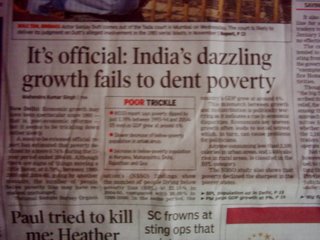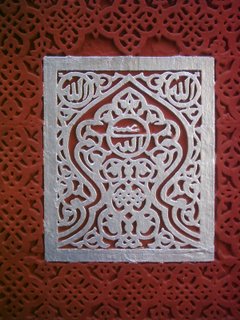See this picture, not that one didn't know it but to appear on the cover page of Time of India is phenomenal. It a sign of inequalities not only economical but others too. But aren't we all fighting in this modern world to eliminate or atleast decrease inequalities? At times looking from a psychological prospective I feel we are not only creating a bigger wedge between the have and the have not we are also dividing those sitting on the fence.
More and more are we building a world where one has to be opinionated and if someone is not, he is dumb or is out of an intellectual conversation. The media encourages us to "Be someone". Being "normal", "ordinary" or "common" is not cool neither in fashion. So then what kind of egalitarian world are we talking about when everybody is encouraged to be "different" and a just-a-face-in-the-crowd personality is not attractive anymore? I call it the death of the ordinary.
Some Screen Shots from Everybody's Fool by Evanescence...
The video harps on the same issue- a world where everybody has to be somebody. So noone should be ordinary. Infact one of the scenes also depicts the "use" of women for glamorous purposes, how they are used as showthings in the name of fashion.
The other day I went to vasant vihar to see a bunch of people from a group called Black Noise (the name gives me bouts of depression), the group claims to confront eve-teasing with some out of the box ideas(one of which is this ), its a letter they hand over to many of the people using the South Extn. subway in Delhi. Umm good idea I'd say. If I look at this act from a very conservative prospective I'd rather end up ask the girls the same questions as many fathers or brother would -Why did you had to go to such a crowded place at first place? But hey I'll refrain, thinking that I'll be called a chauvinist pig. Ideally if I talk to my parents that im being mistreated at a place they'll advise me not to go there. It's a very typical Indian approach, "don't like it? Lump it". But this generation is not as passive as my parents I guess. I heard Suketu Mehta (yeah the Gujju dork who wrote Maximum City) say this as a reply to Naomi Wolf's lecture on feminism at the India Today Conclave and I reproduce parts from his speech "We can't look to our fathers for guides to how we interact with women today. We're not sole providers anymore; it's equally likely that a woman will put food on the table, and expect her man to chop and cook it. We're expected to have an equal share in parenting, but the courts are stacked against men in most custody disputes". And I cannot agree more, this generation is not brought up with the same values as was my mother's generation, this generation has picked up lessons as much from the "K" soaps (they really don't have any lessons to begin with apart from some frustrated soccor moms indulging in cheap tricks for cheap thrills) as from Sex and the City. He goes on to say "What's happening in India today is not the same thing as what happened in America in the '60's and '70s. Indian men and women don't have to follow the American example. We don't have to be that polarized; we don't have to be power feminists or machistas. We have our own understanding of each other, which is complex and subtle, and time-tested." Again, I cannot stop nodding. The relationship Indian men share with Indian men is not the same as western men share with western women. Therefore forcing western feminism (there is even difference between forms of feminism in America) cannot only be judged as a foolish acts by some frustrated Indian women who are virtually talking male bashing and not feminism per say. By propagating women as "different" from men (and therefore needs to maintain a different path) what are we doing? Are we creating equality or are we just wedging them further? Same goes with the OBCs and Muslims ( I know I shouldn't mix them). So by recognizing that OBCs are (or were) suppressed and underprivileged and therefore needs different treatment in the hands of law aren't we isolating them from the "others". It also creates a feeling of frustration amongs those who are not given the same treatment just coz they don't fall into that catagory by virtue of their birth. In all the three cases Feminism, OBCs and Muslims we see that whoever falls in this category is isolated by the others, so though they get the velvet treatment in many places but they are ghettoized in the main stream (Muslims and OBCs being great examples) as the others see them gaining advantage not on the basis of individual merit but on the basis of collective demerit (religious minority in case of Muslims, people of backward class in case of OBCs). So is this not also part of the Victim Culture? One of the best answer to this question of mine also come from the same speech Suketu Mehta delivered.
Here's a beautiful paragraph he read on why many Indian marriages work inspite of being judged "unequal" by many western minds and I'd like to reproduce it...
"There's a radical difference, of course, between urban Indian women and women in the villages, who are in much more solidly defined sex roles. But we can't just look at the Indian village as a province of superstition, discrimination, and illiteracy. This is the culture that has sustained the world's oldest continuing civilization; there must be something of real value, to both women and men, for it to have lasted so long. I am thinking now of the marriage of my grandparents and parents, both 'arranged' marriages. They are among the happiest marriages I have ever seen, although not quite 'equal' in the western sense. My grandfather ran his jewelry business on the first floor of an old Calcutta building, and my grandmother stayed home on the third floor and cooked and raised six children. As was the custom, not once, in their lifetime, did they say out loud each others' names, but they had no problems talking to each other; shouting, whispering, cajoling, threatening, pleading, singing. They never needed to step out of their roles; they never felt any need to stop becoming man and woman. My grandmother loved my grandfather not in spite, but *because* he was a man, and she liked taking care of him. She knew what he wanted to eat before he even realized he was hungry for it. And my grandfather always loved the pretty girl in my grandmother, the girl he got betrothed to when she was thirteen. Her beauty was no myth for him; he was exalted by it every day. When my grandmother passed away, in her eighties, my grandfather had no more wish to remain on earth. "Your Ba is waiting for me," he kept saying, and followed her in under a year of her passing."
I love him saying this not coz I'm Indian and therefore resolute in liking it but coz it some how spills the beans of any firm relationship, that the best of relationships are perhaps not equal, the master need to have a slave, a husband needs to have a wife (no I'm not comparing a wife to a slave).
Today was a torturous Thursday and I feel I'm almost suffering from TB. The cough has not gone for almost a month (did I tell you I drink a lot of chilled water? hehe). The mag is also in its final stages so this time I might get to do some desktop publishing job as well which is good. I become the jack of all the trades. I still need to conduct atleast one interview for principal speak and a feature on Austraaalian Education ( the lady at IDP never returns the call). Its almost 2 (yeah am doode) and me must get me arse to bed.
(Reproduced from my other Blog)


1 comment:
This is really interesting and really made me think :) That's the thing with the western world - they expect their way to be the only right way. This goes for feminism. And also for democracy and capitalism. I believe each country, especially in a country as different and culturally ground as India, has different ways of presenting things - especially in regards to equality. I mean - I've definately been brought up with the mindset that I don't need a man and I can do whatever i want to be financially sound but it's different in some parts of India where women have different ambitions and different methods to get by.
I loved the story of your grandparents- very sweet and sad at the same time :)
-Amy
Post a Comment